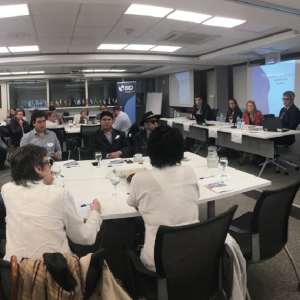From the presentation made in Argentina of the Independent Consultation and Investigation Mechanism (ICIM), RACI interviewed Eduardo Arraiza, Operation Mr Specialist to tell us about the strategies for the relationship with Civil Society.
- In the framework of the IDB’s efforts to work with different sectors of society, what are the strategies that are currently being implemented in the region to achieve these synergies?
Within its normative framework, the IDB has built different country strategies through which it collaborates and promotes multi-sectoral development. Specifically, in the field of Civil Society, last year a strategy was adopted to envisages five instances aimed at strengthening ties with those who compose it. The first is an instance of information that promotes the opening of all projects executed by the IDB; the second refers to the dialogue. In this case, the call aims to promote the participation of Civil Society in spaces to exchange experiences, opinions and collaborative work. The third initiative has to do with different channels of consultations offered by the IDB, the fourth with collaborative spaces and the fifth has to do with alliances. In this last space, the link between Civil Society Organizations is strengthened through pilot projects to reward or promote concrete actions of different institutions.
- What are the programs or actions that would highlight success and sustainability recently in relation to the synergies mentioned above?
Within the framework of the new strategy, the WICONNECT3 platform is an instrument designed to improve the relationship with Civil Society that is used to register all CSOs in each IDB member country and the platform will serve as input for the five applications above mentioned: information, dialogue, consultations, collaboration, and alliances. The platform is very clear: requests a registration to provide the name of the organization, the sectors where it works and the scope or regional level in which it develops. Access is free and the consultations can be filtered by country or thematic area in order to know what NGO is working on what matters or geographic region. The idea of the platform is to work as an input for all of the Bank’s project teams that at the moment are preparing operations and can consult which are the organizations that can be found working in the area where perhaps these operations will have some effect.
- What areas of relation do you consider most relevant?
The action we believe has created the greatest relationship between Civil Society Organizations of regional countries is the Forum of the Civil society where every year we promote a different thematic topic. The topic that will be convened this year is “the future of work”. In this space, the representatives of Civil Society of all the bank’s country offices meet. Participation is also open to all those organizations that want to participate with the objective to build a regional vision on the subject defined and to strengthen ties.
- In Argentina, what are the channels or pathways of communication that CSOS have in order to link with the IDB?
First, our website contains all open documents and is available for anyone to access. On the other hand, each office has a civil society liaison that is the one who attends the consultations and who organizes the actions that are done together. Additionally, the IDB has other mechanisms such as the independent consultation and Research mechanism (ICIM), for which an explanatory workshop was held in Argentina with the support of RACI. The objective of the event was to increase the visibility of the channel among CSOs, but also that CSOs could disseminate the possibilities that the tool provides of generating consultations or requesting a research on certain aspects of the projects of the IDB which, according to the criterion of civil society, are causing damage or inconvenience. To learn more about this channel, we invite you to visit the web page: https://www.iadb.org/es/mici/mici-mecanismo-independiente-de-consulta-e-investigacion.

